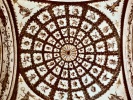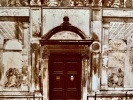ROCHE (Maurice), WHITE (Katherine Anne, dite Cuchi).
White Vision.
Paris, les auteurs, 1980. Grande feuille d’Arches pliée en 16 (15,2/19,6 cm) et insérée dans un étui Édition originale tirée à 100 ex. numérotés et signés, 6 textes et 6 photographies originales en couleurs. Bon état.
Reference : AWD-799
Bookseller's contact details
Actualités
M. Daniel Azoulay
15, rue Gay-Lussac
75005 Paris
France
00 33 (0)6 72 07 91 06
Payment mode

Sale conditions
Conditions de vente conformes aux usages de la librairie ancienne et moderne
4 book(s) with the same title
Revue Question de - Marc de Smedt - William James - Georges Russell - Gilles Farcet - Jean-Pierre Bayard sur Arthur Rimbaud - Alex Lhermillier sur Blaise Cendrars - Michèle Duclos sur Kenneth White et Antonin Artaud - Hervé Pigelet - Mario Mercier - Jean Alziary - Carole Pauly - Patricia Moureville - Yvonne Caroutch - Ariane Buisset - Jean-Yves Leloup
Reference : 87570
(1990)
Revue Question de - Numéro 82 - 3eme trimestre 1990 - L'esprit visionnaire , (L'esprit visionnaire - Le mysticisme - Du mélange des natures - Les deux grands disparus du cercle des poètes - L'expérience visionnaire d'Arthur Rimbaud - Blaise Cendrars, un aventurier de l'esprit - Kenneth White et le monde d'Antonin Artaud - Pour une vision essentielle - L'expérience visionnaire - Poèmes - Changer le regard d'espace - A l'aube d'une nouvelle vision - Vision et monde sonore - Pour une autre dimension du cinéma - Manifeste pour un nouveau chamanisme - Le vol de la vacuité - Le passe sans porte - La source cachée)
Editions Albin Michel , Revue Question de Malicorne sur Sarthe, 72, Pays de la Loire, France 1990 Book condition, Etat : Bon broché, sous couverture imprimée éditeur blanche, illustrée d'une encre de Chine avec des figurines grand In-8 1 vol. - 105 pages
quelques illustrations dans le texte en noir et blanc 1ere édition, 1990 Contents, Chapitres : Marc de Smedt : L'esprit visionnaire - William James : Le mysticisme - Georges Russell : Du mélange des natures - Gilles Farcet : Les deux grands disparus du cercle des poètes - Jean-Pierre Bayard : L'expérience visionnaire d'Arthur Rimbaud - Alex Lhermillier : Blaise Cendrars, un aventurier de l'esprit - Michèle Duclos : Kenneth White et le monde d'Antonin Artaud - Hervé Pigelet : Pour une vision essentielle - W. Blake : L'expérience visionnaire - Poèmes - Mario Mercier : Changer le regard d'espace - Jean Alziary : A l'aube d'une nouvelle vision - Carole Pauly : Vision et monde sonore - Patricia Moureville : Pour une autre dimension du cinéma - Mario Mercier : Manifeste pour un nouveau chamanisme - Yvonne Caroutch : Le vol de la vacuité - Ariane Buisset : Le passe sans porte - Jean-Yves Leloup : La source cachée couverture à peine jaunie avec une petite tache discrete sur le plat supérieiur, infimes traces de pliures aux coins des plats de la couverture, intérieur sinon frais et propre, cela reste un bon exemplaire
Two Essays: One upon Single Vision with Two Eyes" the Other on Dew. A Letter to the Right Hon. Lloyd, Lord Kenyon and an Account of a Female of the White Race of Mankind, Part of whose Skin Resembles that of a Negro (+) An Account of a Female of the W... - [THE FIRST RECOGNIZABLE STATEMENT OF THE THEORY OF NATURAL SELECTION]
London, Archibald Constable and Co, 1818. 8vo. Bound uncut in a nice recent half calf binding with five raised bands with gilt lettering and ornamentation to spine. A very nice and clean copy. (6), (I)-LXXIV, (2), 439, (1) pp.
First appearance of Well's important work, which constitutes the first clear pioneering statement about natural selection. He applied the idea to the origin of different skin colours in human races, but from the context it seems he thought it might be applied more widely. Charles Darwin said: ""[Wells] distinctly recognises the principle of natural selection, and this is the first recognition which has been indicated"". (Darwin, Charles 1866. The origin of species by means of natural selection. 4th and subsequent editions, in the preliminary 'Historical sketch')In 1813, Wells read a paper to the Royal Society of London, occasioned by a white female patient with splotches of dark skin. In his paper, Wells speculated about the origin of skin color variations in humans. He suggested that long ago, there might have arisen in equatorial regions a variety of humans that were better able to resist diseases such as malaria, perhaps aided by darker skin, and they survived where other variations perished. Similarly, lighter-skinned humans might have been variations that were better able to survive in temperate and arctic regions.""Wells' paper was not printed in the Philosophical Transactions, but after he died in 1817, two of his treatises, ""On Single vision with Two Eyes,"" and ""On Dew"", were published posthumously, and Wells' brief ""Account of a white female, part of whose skin resembles that of a negro"" was added on at the very end. No one noticed, certainly not Charles Darwin, who was 9 years old at the time.Time went by, Darwin discovered natural selection on his own in the late 1830s, and he sprang it on the world in On the Origin of Species in 1859. During the year after publication, various readers noticed that certain aspects of Darwinian evolution had been anticipated by such naturalists as Étienne Geoffroy St. Hilaire, Patrick Matthew, and the anonymous author of the Vestiges. So in 1861, for the third edition of the Origin, Darwin added an ""Historical Sketch"" in which he discussed his precursors and to what extent they anticipated his own work (third image). Geoffroy St. Hilaire, Matthew, and the Vestiges all merited a paragraph in the ""Historical Sketch."" But there was still no mention of William Wells.Then, sometime before 1866, an American, Robert Rowley, drew the attention of an Englishman, Charles Loring Brace, to Wells' paper, and Rowley conveyed the information to Darwin. Darwin was apparently impressed. For the fifth edition of the Origin, he revised the ""Historical Sketch"", and he added a paragraph about Wells, in which he commented: ""In this paper he [Wells] distinctly recognises the principle of natural selection, and this is the first recognition which has been indicated."" Darwin also pointed out, quite correctly, that Wells used natural selection only to account for human races, not to explain the origin of species. But still, Wells was the only precursor of natural selection that Darwin took seriously.""( William B. Ashworth, Linda Hall Library)
DISQUE VINYLE 33T COLD AS ICE, DOUBLE VISION, HEAD GAMES, WAITING FOR A GIRL LIKE YOU, FEELS LIKE THE FIRST TIME, URGENT, DIRTY WHITE BOY, JUKE BOX HERO, LONG LONG WAY FROM HOME, HOT BLOODED.
ATLANTIC. non daté. In-12. Broché. Etat d'usage, Couv. convenable, Dos satisfaisant, Intérieur frais. Pochette en couleurs, grande photo en noir et blanc à l'intérieur de la pochete.. . . . Classification : 410-33 Tours
Disque n°78.0999-1 Classification : 410-33 Tours
DISQUE VINYLE 33T HAVE A TRY, SIX OF THE BEST, IF I HAD A SON, A BOY'S POINT OF VIEW, VISION OF YOUTH, WARWICKSHIRE HOME/ONE FOR YOUR NOSE, HOLD ME, THE BALLAD OF THE GREAT WHITE HORSE, YOUNG TOM, PETTICOAT GOVERNMENT/I LIKE MY CHILDREN AROUND, MY WAY....
DECCA. non daté. In-12. Broché. Bon état, Couv. convenable, Dos satisfaisant, Intérieur frais. Pochette en couleurs, biographie de JOAN MAITLAND dérrière la pochette avec une photo en noir et blanc. Disque en anglais.. . . . Classification : 410-33 Tours
Disque n° SKL 5137 Classification : 410-33 Tours
 Write to the booksellers
Write to the booksellers










